BTEC HND: Entrepreneurship & Small Business Management Report
VerifiedAdded on 2023/01/05
|14
|3485
|43
Report
AI Summary
This report provides a detailed analysis of entrepreneurship and small business management within the UK context. It scrutinizes various types of entrepreneurial ventures, highlighting their similarities and differences, and assesses their impact on the UK's financial system. The report also delves into the characteristics and skills of successful entrepreneurs, exploring how these traits reflect entrepreneurial motivation and mindset. Furthermore, it examines how background and knowledge can either hinder or promote entrepreneurship. Specific examples, such as MOMS food and SGS products UK, are used to illustrate different venture types. The report concludes by emphasizing the significant role of small businesses in creating employment, fostering innovation, and promoting workforce diversity within the social economy. Desklib offers a platform for students to access similar solved assignments and study resources.

Entrepreneurship and Small
Business Management
Business Management
Paraphrase This Document
Need a fresh take? Get an instant paraphrase of this document with our AI Paraphraser
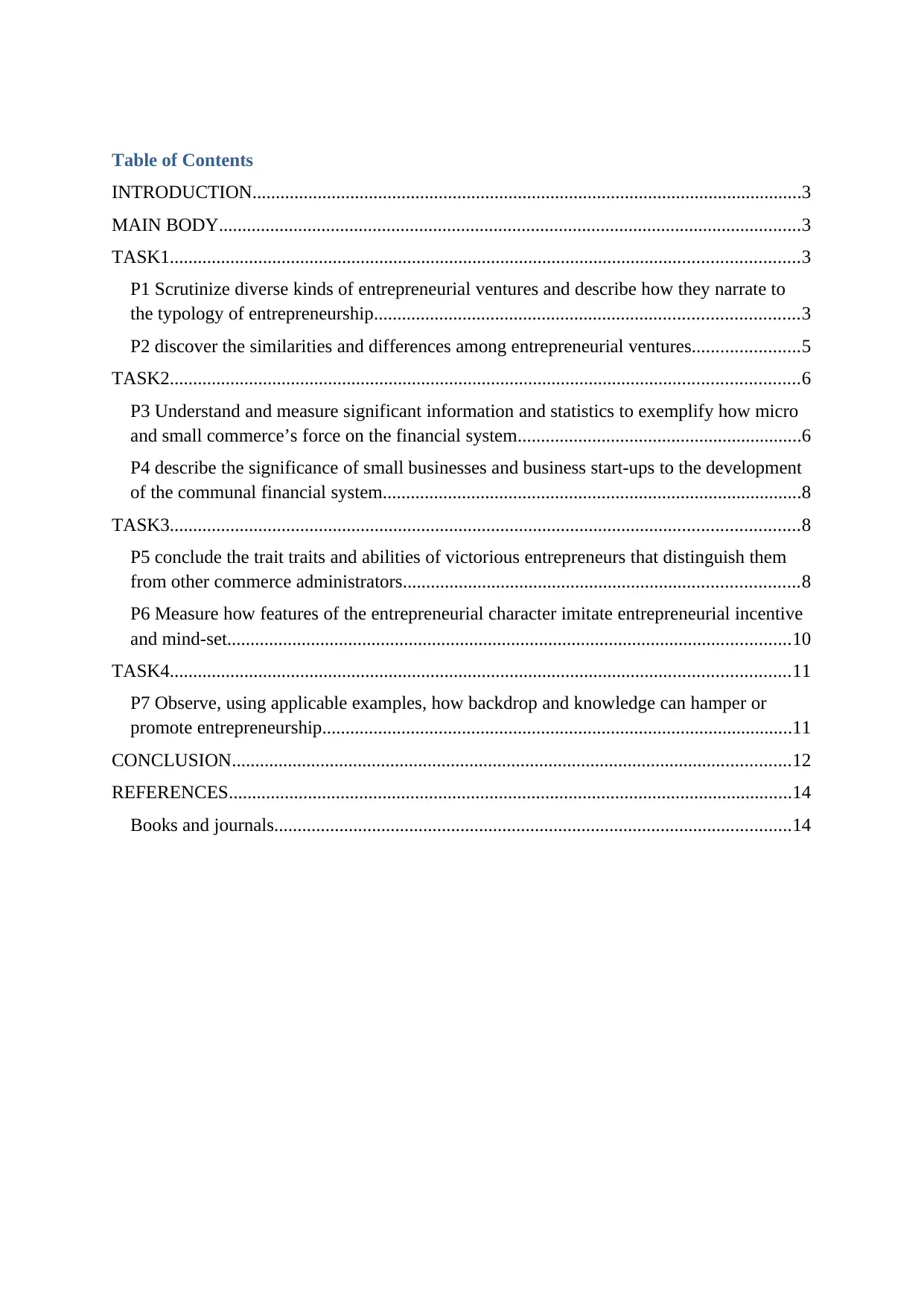
Table of Contents
INTRODUCTION......................................................................................................................3
MAIN BODY.............................................................................................................................3
TASK1.......................................................................................................................................3
P1 Scrutinize diverse kinds of entrepreneurial ventures and describe how they narrate to
the typology of entrepreneurship...........................................................................................3
P2 discover the similarities and differences among entrepreneurial ventures.......................5
TASK2.......................................................................................................................................6
P3 Understand and measure significant information and statistics to exemplify how micro
and small commerce’s force on the financial system.............................................................6
P4 describe the significance of small businesses and business start-ups to the development
of the communal financial system..........................................................................................8
TASK3.......................................................................................................................................8
P5 conclude the trait traits and abilities of victorious entrepreneurs that distinguish them
from other commerce administrators.....................................................................................8
P6 Measure how features of the entrepreneurial character imitate entrepreneurial incentive
and mind-set.........................................................................................................................10
TASK4.....................................................................................................................................11
P7 Observe, using applicable examples, how backdrop and knowledge can hamper or
promote entrepreneurship.....................................................................................................11
CONCLUSION........................................................................................................................12
REFERENCES.........................................................................................................................14
Books and journals...............................................................................................................14
INTRODUCTION......................................................................................................................3
MAIN BODY.............................................................................................................................3
TASK1.......................................................................................................................................3
P1 Scrutinize diverse kinds of entrepreneurial ventures and describe how they narrate to
the typology of entrepreneurship...........................................................................................3
P2 discover the similarities and differences among entrepreneurial ventures.......................5
TASK2.......................................................................................................................................6
P3 Understand and measure significant information and statistics to exemplify how micro
and small commerce’s force on the financial system.............................................................6
P4 describe the significance of small businesses and business start-ups to the development
of the communal financial system..........................................................................................8
TASK3.......................................................................................................................................8
P5 conclude the trait traits and abilities of victorious entrepreneurs that distinguish them
from other commerce administrators.....................................................................................8
P6 Measure how features of the entrepreneurial character imitate entrepreneurial incentive
and mind-set.........................................................................................................................10
TASK4.....................................................................................................................................11
P7 Observe, using applicable examples, how backdrop and knowledge can hamper or
promote entrepreneurship.....................................................................................................11
CONCLUSION........................................................................................................................12
REFERENCES.........................................................................................................................14
Books and journals...............................................................................................................14
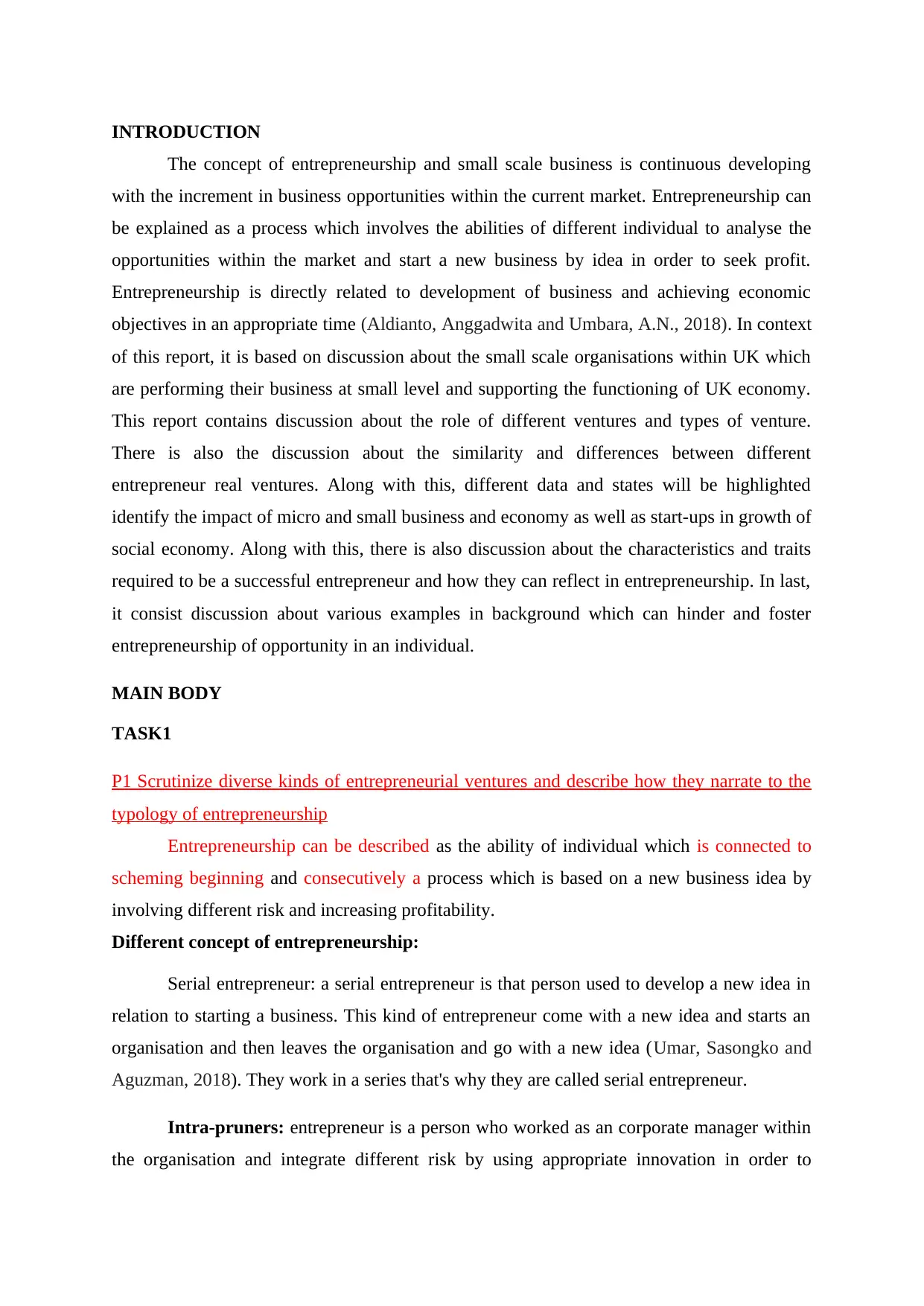
INTRODUCTION
The concept of entrepreneurship and small scale business is continuous developing
with the increment in business opportunities within the current market. Entrepreneurship can
be explained as a process which involves the abilities of different individual to analyse the
opportunities within the market and start a new business by idea in order to seek profit.
Entrepreneurship is directly related to development of business and achieving economic
objectives in an appropriate time (Aldianto, Anggadwita and Umbara, A.N., 2018). In context
of this report, it is based on discussion about the small scale organisations within UK which
are performing their business at small level and supporting the functioning of UK economy.
This report contains discussion about the role of different ventures and types of venture.
There is also the discussion about the similarity and differences between different
entrepreneur real ventures. Along with this, different data and states will be highlighted
identify the impact of micro and small business and economy as well as start-ups in growth of
social economy. Along with this, there is also discussion about the characteristics and traits
required to be a successful entrepreneur and how they can reflect in entrepreneurship. In last,
it consist discussion about various examples in background which can hinder and foster
entrepreneurship of opportunity in an individual.
MAIN BODY
TASK1
P1 Scrutinize diverse kinds of entrepreneurial ventures and describe how they narrate to the
typology of entrepreneurship
Entrepreneurship can be described as the ability of individual which is connected to
scheming beginning and consecutively a process which is based on a new business idea by
involving different risk and increasing profitability.
Different concept of entrepreneurship:
Serial entrepreneur: a serial entrepreneur is that person used to develop a new idea in
relation to starting a business. This kind of entrepreneur come with a new idea and starts an
organisation and then leaves the organisation and go with a new idea (Umar, Sasongko and
Aguzman, 2018). They work in a series that's why they are called serial entrepreneur.
Intra-pruners: entrepreneur is a person who worked as an corporate manager within
the organisation and integrate different risk by using appropriate innovation in order to
The concept of entrepreneurship and small scale business is continuous developing
with the increment in business opportunities within the current market. Entrepreneurship can
be explained as a process which involves the abilities of different individual to analyse the
opportunities within the market and start a new business by idea in order to seek profit.
Entrepreneurship is directly related to development of business and achieving economic
objectives in an appropriate time (Aldianto, Anggadwita and Umbara, A.N., 2018). In context
of this report, it is based on discussion about the small scale organisations within UK which
are performing their business at small level and supporting the functioning of UK economy.
This report contains discussion about the role of different ventures and types of venture.
There is also the discussion about the similarity and differences between different
entrepreneur real ventures. Along with this, different data and states will be highlighted
identify the impact of micro and small business and economy as well as start-ups in growth of
social economy. Along with this, there is also discussion about the characteristics and traits
required to be a successful entrepreneur and how they can reflect in entrepreneurship. In last,
it consist discussion about various examples in background which can hinder and foster
entrepreneurship of opportunity in an individual.
MAIN BODY
TASK1
P1 Scrutinize diverse kinds of entrepreneurial ventures and describe how they narrate to the
typology of entrepreneurship
Entrepreneurship can be described as the ability of individual which is connected to
scheming beginning and consecutively a process which is based on a new business idea by
involving different risk and increasing profitability.
Different concept of entrepreneurship:
Serial entrepreneur: a serial entrepreneur is that person used to develop a new idea in
relation to starting a business. This kind of entrepreneur come with a new idea and starts an
organisation and then leaves the organisation and go with a new idea (Umar, Sasongko and
Aguzman, 2018). They work in a series that's why they are called serial entrepreneur.
Intra-pruners: entrepreneur is a person who worked as an corporate manager within
the organisation and integrate different risk by using appropriate innovation in order to
⊘ This is a preview!⊘
Do you want full access?
Subscribe today to unlock all pages.

Trusted by 1+ million students worldwide
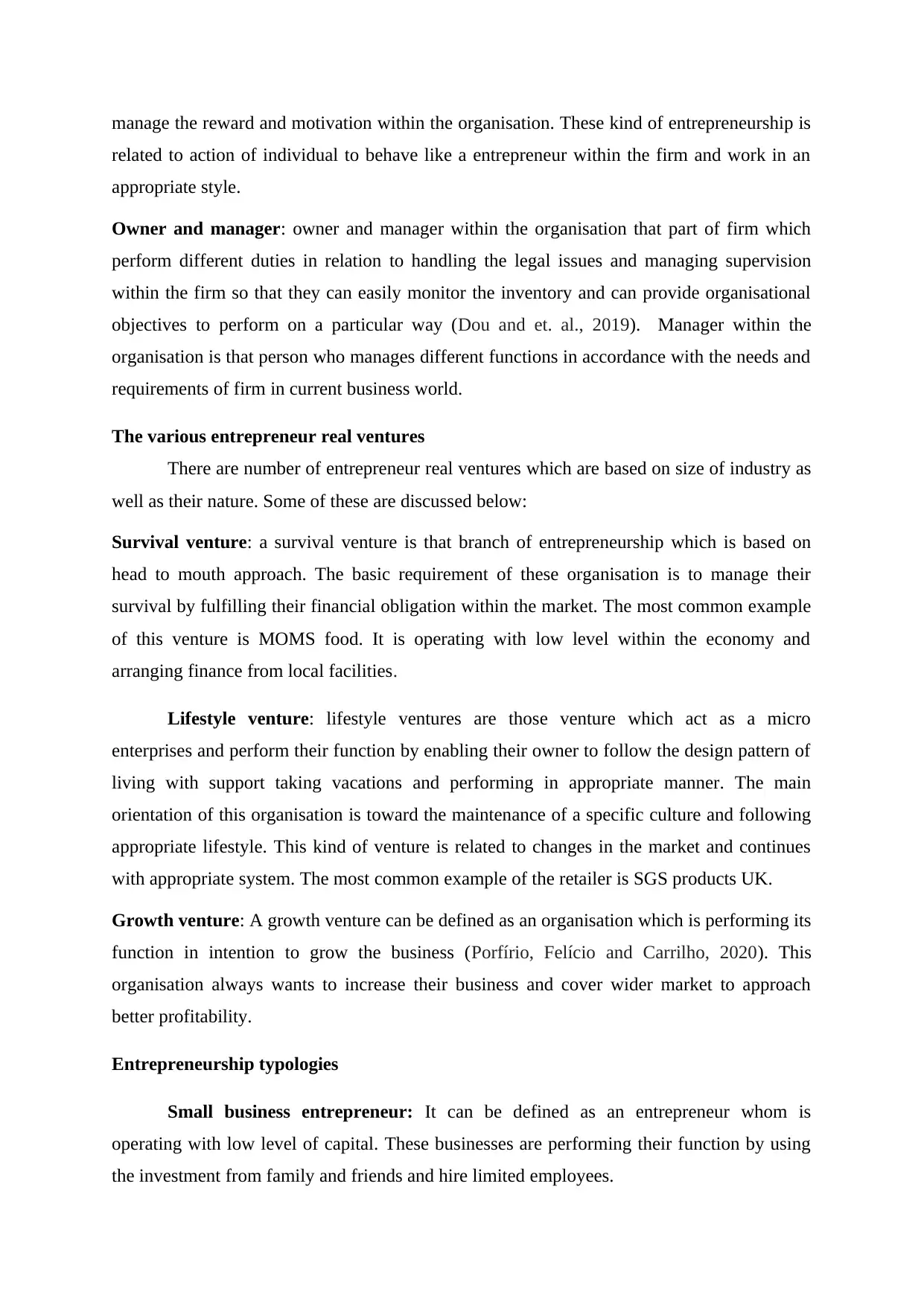
manage the reward and motivation within the organisation. These kind of entrepreneurship is
related to action of individual to behave like a entrepreneur within the firm and work in an
appropriate style.
Owner and manager: owner and manager within the organisation that part of firm which
perform different duties in relation to handling the legal issues and managing supervision
within the firm so that they can easily monitor the inventory and can provide organisational
objectives to perform on a particular way (Dou and et. al., 2019). Manager within the
organisation is that person who manages different functions in accordance with the needs and
requirements of firm in current business world.
The various entrepreneur real ventures
There are number of entrepreneur real ventures which are based on size of industry as
well as their nature. Some of these are discussed below:
Survival venture: a survival venture is that branch of entrepreneurship which is based on
head to mouth approach. The basic requirement of these organisation is to manage their
survival by fulfilling their financial obligation within the market. The most common example
of this venture is MOMS food. It is operating with low level within the economy and
arranging finance from local facilities.
Lifestyle venture: lifestyle ventures are those venture which act as a micro
enterprises and perform their function by enabling their owner to follow the design pattern of
living with support taking vacations and performing in appropriate manner. The main
orientation of this organisation is toward the maintenance of a specific culture and following
appropriate lifestyle. This kind of venture is related to changes in the market and continues
with appropriate system. The most common example of the retailer is SGS products UK.
Growth venture: A growth venture can be defined as an organisation which is performing its
function in intention to grow the business (Porfírio, Felício and Carrilho, 2020). This
organisation always wants to increase their business and cover wider market to approach
better profitability.
Entrepreneurship typologies
Small business entrepreneur: It can be defined as an entrepreneur whom is
operating with low level of capital. These businesses are performing their function by using
the investment from family and friends and hire limited employees.
related to action of individual to behave like a entrepreneur within the firm and work in an
appropriate style.
Owner and manager: owner and manager within the organisation that part of firm which
perform different duties in relation to handling the legal issues and managing supervision
within the firm so that they can easily monitor the inventory and can provide organisational
objectives to perform on a particular way (Dou and et. al., 2019). Manager within the
organisation is that person who manages different functions in accordance with the needs and
requirements of firm in current business world.
The various entrepreneur real ventures
There are number of entrepreneur real ventures which are based on size of industry as
well as their nature. Some of these are discussed below:
Survival venture: a survival venture is that branch of entrepreneurship which is based on
head to mouth approach. The basic requirement of these organisation is to manage their
survival by fulfilling their financial obligation within the market. The most common example
of this venture is MOMS food. It is operating with low level within the economy and
arranging finance from local facilities.
Lifestyle venture: lifestyle ventures are those venture which act as a micro
enterprises and perform their function by enabling their owner to follow the design pattern of
living with support taking vacations and performing in appropriate manner. The main
orientation of this organisation is toward the maintenance of a specific culture and following
appropriate lifestyle. This kind of venture is related to changes in the market and continues
with appropriate system. The most common example of the retailer is SGS products UK.
Growth venture: A growth venture can be defined as an organisation which is performing its
function in intention to grow the business (Porfírio, Felício and Carrilho, 2020). This
organisation always wants to increase their business and cover wider market to approach
better profitability.
Entrepreneurship typologies
Small business entrepreneur: It can be defined as an entrepreneur whom is
operating with low level of capital. These businesses are performing their function by using
the investment from family and friends and hire limited employees.
Paraphrase This Document
Need a fresh take? Get an instant paraphrase of this document with our AI Paraphraser
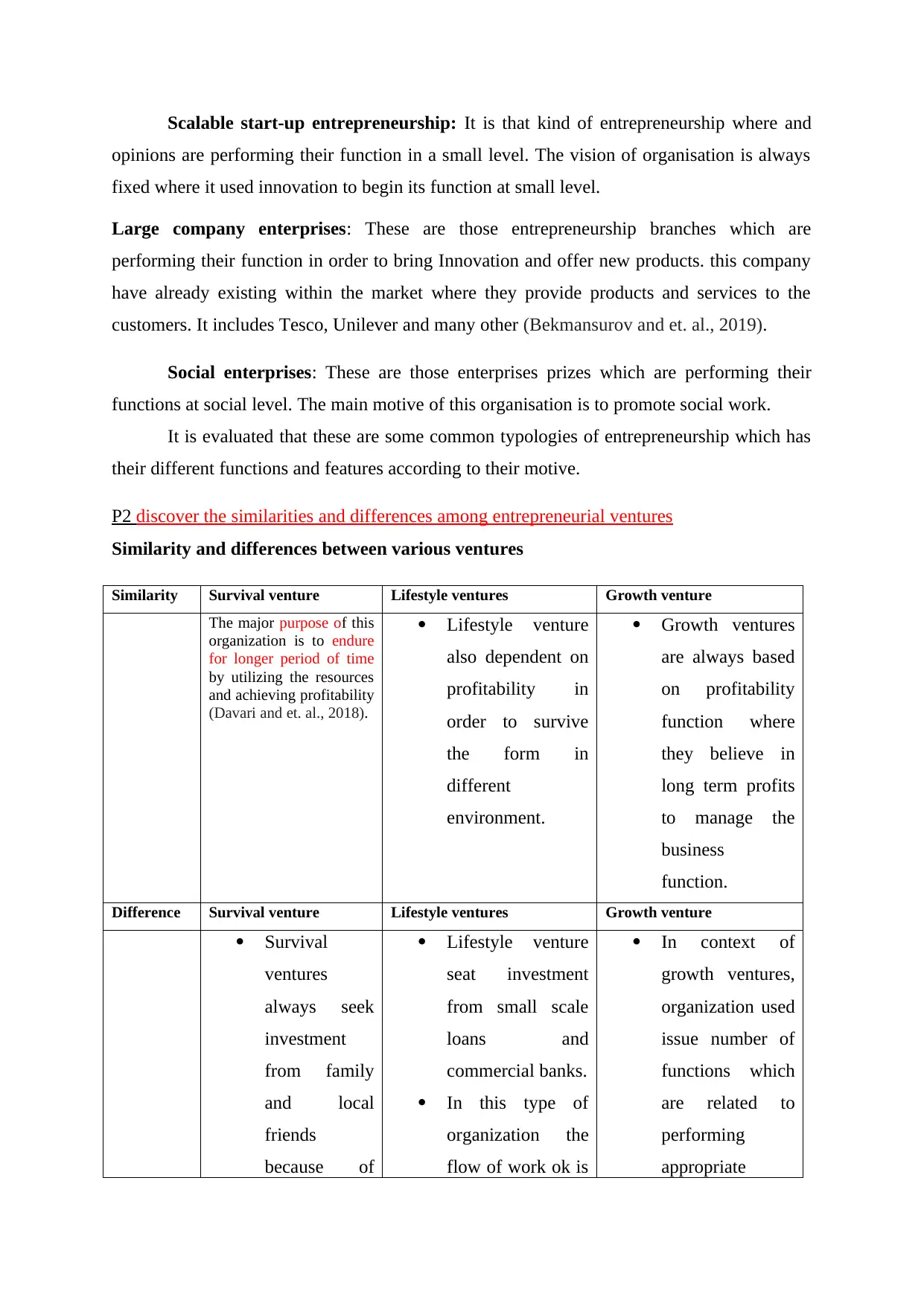
Scalable start-up entrepreneurship: It is that kind of entrepreneurship where and
opinions are performing their function in a small level. The vision of organisation is always
fixed where it used innovation to begin its function at small level.
Large company enterprises: These are those entrepreneurship branches which are
performing their function in order to bring Innovation and offer new products. this company
have already existing within the market where they provide products and services to the
customers. It includes Tesco, Unilever and many other (Bekmansurov and et. al., 2019).
Social enterprises: These are those enterprises prizes which are performing their
functions at social level. The main motive of this organisation is to promote social work.
It is evaluated that these are some common typologies of entrepreneurship which has
their different functions and features according to their motive.
P2 discover the similarities and differences among entrepreneurial ventures
Similarity and differences between various ventures
Similarity Survival venture Lifestyle ventures Growth venture
The major purpose of this
organization is to endure
for longer period of time
by utilizing the resources
and achieving profitability
(Davari and et. al., 2018).
Lifestyle venture
also dependent on
profitability in
order to survive
the form in
different
environment.
Growth ventures
are always based
on profitability
function where
they believe in
long term profits
to manage the
business
function.
Difference Survival venture Lifestyle ventures Growth venture
Survival
ventures
always seek
investment
from family
and local
friends
because of
Lifestyle venture
seat investment
from small scale
loans and
commercial banks.
In this type of
organization the
flow of work ok is
In context of
growth ventures,
organization used
issue number of
functions which
are related to
performing
appropriate
opinions are performing their function in a small level. The vision of organisation is always
fixed where it used innovation to begin its function at small level.
Large company enterprises: These are those entrepreneurship branches which are
performing their function in order to bring Innovation and offer new products. this company
have already existing within the market where they provide products and services to the
customers. It includes Tesco, Unilever and many other (Bekmansurov and et. al., 2019).
Social enterprises: These are those enterprises prizes which are performing their
functions at social level. The main motive of this organisation is to promote social work.
It is evaluated that these are some common typologies of entrepreneurship which has
their different functions and features according to their motive.
P2 discover the similarities and differences among entrepreneurial ventures
Similarity and differences between various ventures
Similarity Survival venture Lifestyle ventures Growth venture
The major purpose of this
organization is to endure
for longer period of time
by utilizing the resources
and achieving profitability
(Davari and et. al., 2018).
Lifestyle venture
also dependent on
profitability in
order to survive
the form in
different
environment.
Growth ventures
are always based
on profitability
function where
they believe in
long term profits
to manage the
business
function.
Difference Survival venture Lifestyle ventures Growth venture
Survival
ventures
always seek
investment
from family
and local
friends
because of
Lifestyle venture
seat investment
from small scale
loans and
commercial banks.
In this type of
organization the
flow of work ok is
In context of
growth ventures,
organization used
issue number of
functions which
are related to
performing
appropriate
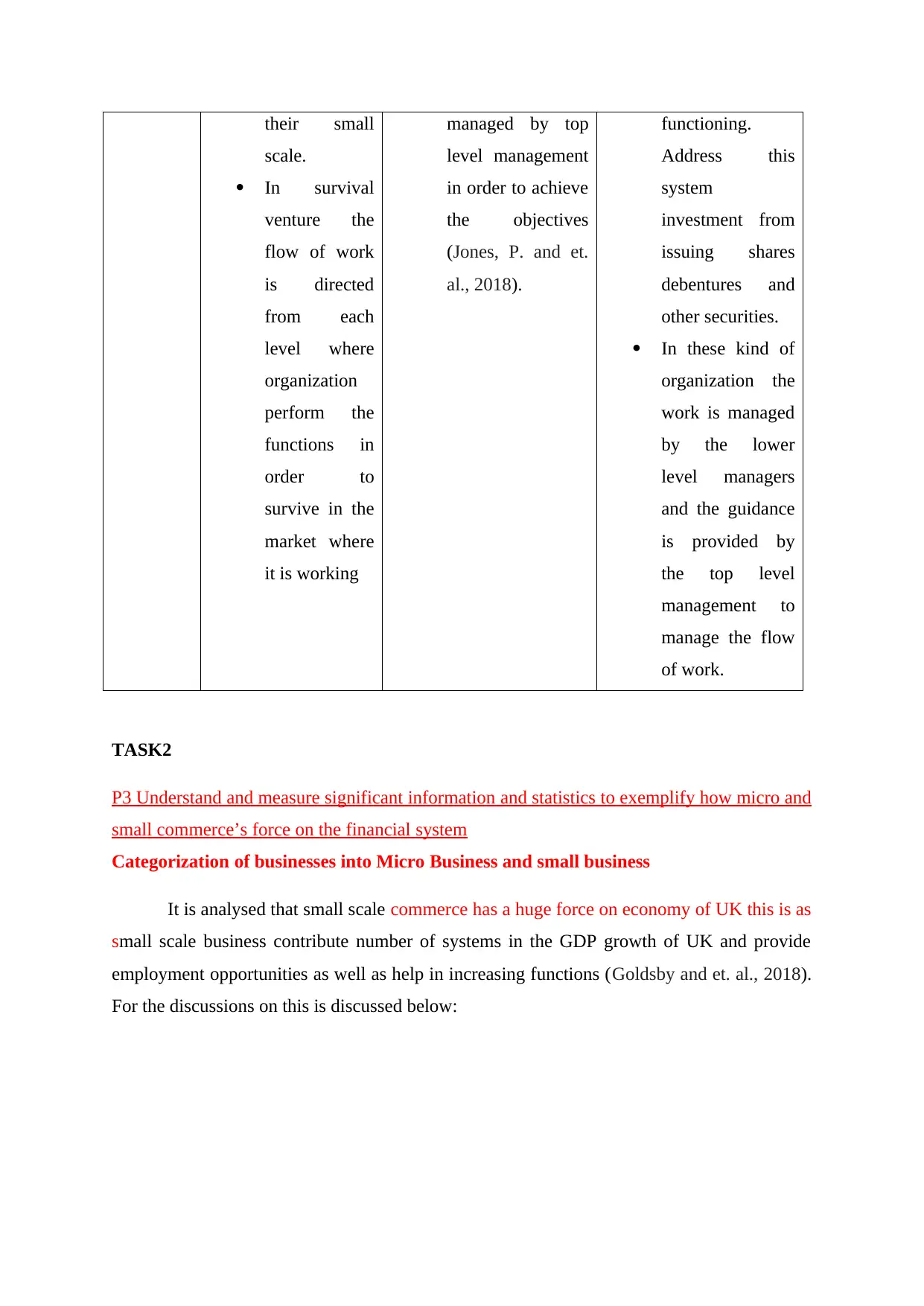
their small
scale.
In survival
venture the
flow of work
is directed
from each
level where
organization
perform the
functions in
order to
survive in the
market where
it is working
managed by top
level management
in order to achieve
the objectives
(Jones, P. and et.
al., 2018).
functioning.
Address this
system
investment from
issuing shares
debentures and
other securities.
In these kind of
organization the
work is managed
by the lower
level managers
and the guidance
is provided by
the top level
management to
manage the flow
of work.
TASK2
P3 Understand and measure significant information and statistics to exemplify how micro and
small commerce’s force on the financial system
Categorization of businesses into Micro Business and small business
It is analysed that small scale commerce has a huge force on economy of UK this is as
small scale business contribute number of systems in the GDP growth of UK and provide
employment opportunities as well as help in increasing functions (Goldsby and et. al., 2018).
For the discussions on this is discussed below:
scale.
In survival
venture the
flow of work
is directed
from each
level where
organization
perform the
functions in
order to
survive in the
market where
it is working
managed by top
level management
in order to achieve
the objectives
(Jones, P. and et.
al., 2018).
functioning.
Address this
system
investment from
issuing shares
debentures and
other securities.
In these kind of
organization the
work is managed
by the lower
level managers
and the guidance
is provided by
the top level
management to
manage the flow
of work.
TASK2
P3 Understand and measure significant information and statistics to exemplify how micro and
small commerce’s force on the financial system
Categorization of businesses into Micro Business and small business
It is analysed that small scale commerce has a huge force on economy of UK this is as
small scale business contribute number of systems in the GDP growth of UK and provide
employment opportunities as well as help in increasing functions (Goldsby and et. al., 2018).
For the discussions on this is discussed below:
⊘ This is a preview!⊘
Do you want full access?
Subscribe today to unlock all pages.

Trusted by 1+ million students worldwide
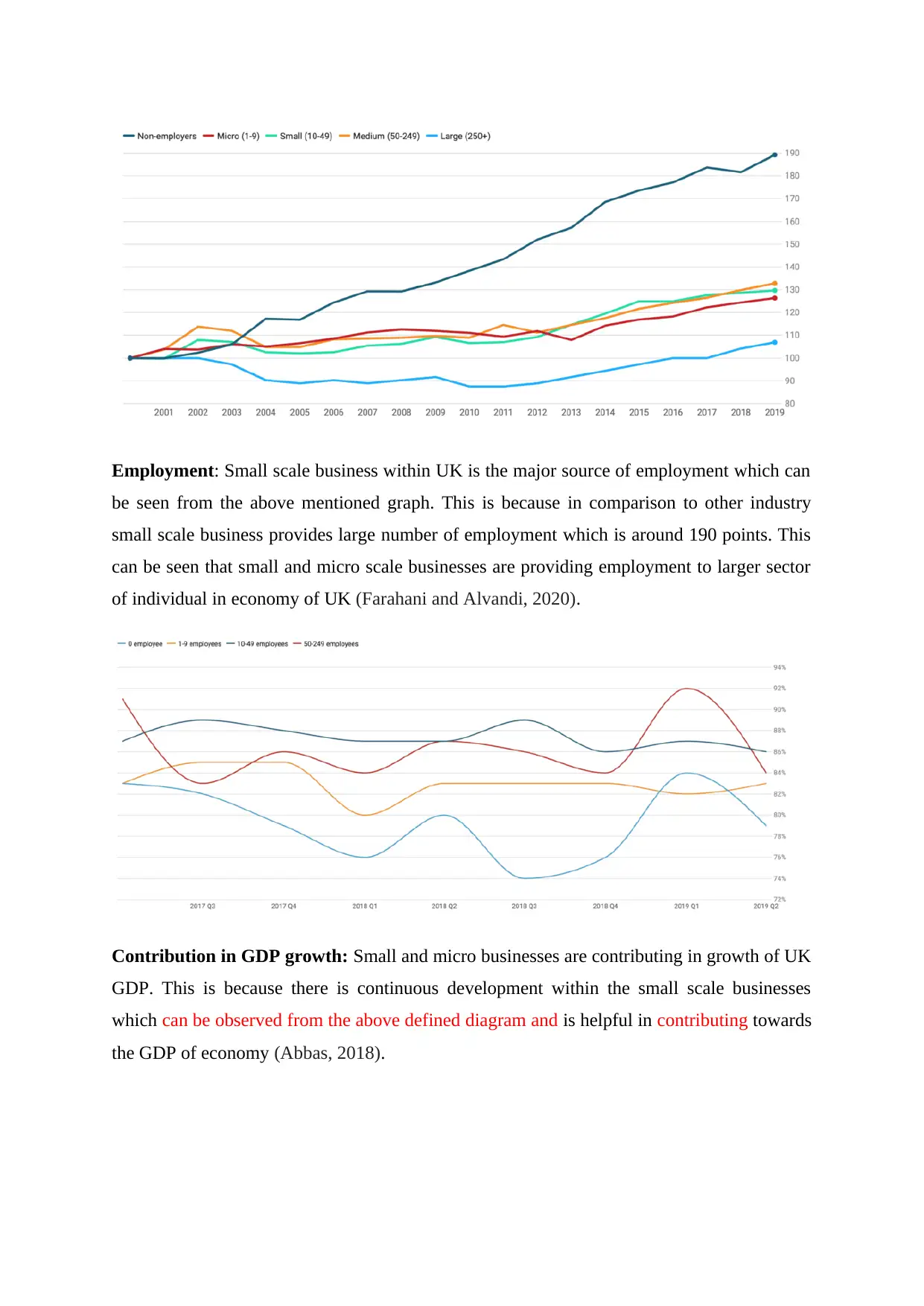
Employment: Small scale business within UK is the major source of employment which can
be seen from the above mentioned graph. This is because in comparison to other industry
small scale business provides large number of employment which is around 190 points. This
can be seen that small and micro scale businesses are providing employment to larger sector
of individual in economy of UK (Farahani and Alvandi, 2020).
Contribution in GDP growth: Small and micro businesses are contributing in growth of UK
GDP. This is because there is continuous development within the small scale businesses
which can be observed from the above defined diagram and is helpful in contributing towards
the GDP of economy (Abbas, 2018).
be seen from the above mentioned graph. This is because in comparison to other industry
small scale business provides large number of employment which is around 190 points. This
can be seen that small and micro scale businesses are providing employment to larger sector
of individual in economy of UK (Farahani and Alvandi, 2020).
Contribution in GDP growth: Small and micro businesses are contributing in growth of UK
GDP. This is because there is continuous development within the small scale businesses
which can be observed from the above defined diagram and is helpful in contributing towards
the GDP of economy (Abbas, 2018).
Paraphrase This Document
Need a fresh take? Get an instant paraphrase of this document with our AI Paraphraser
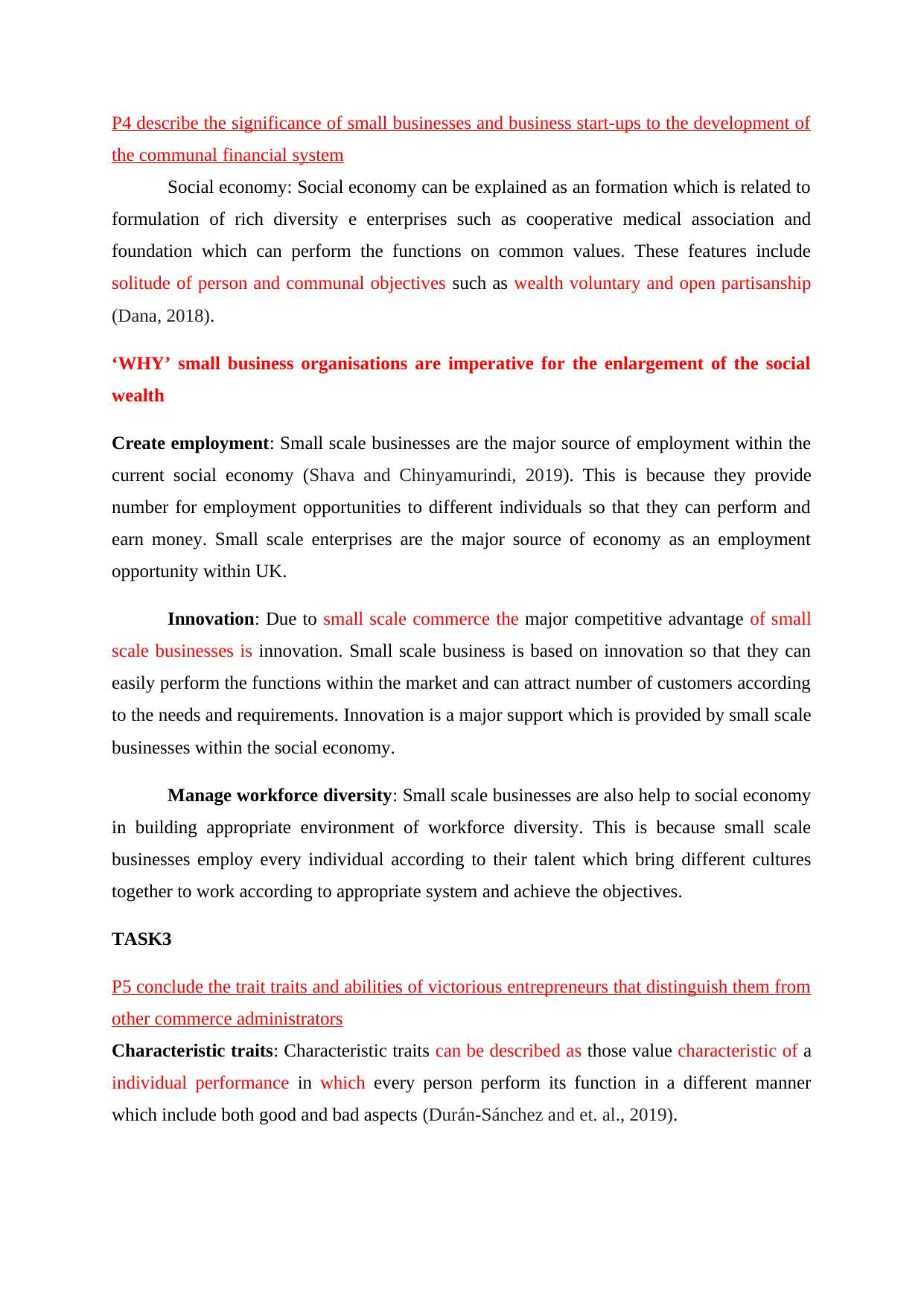
P4 describe the significance of small businesses and business start-ups to the development of
the communal financial system
Social economy: Social economy can be explained as an formation which is related to
formulation of rich diversity e enterprises such as cooperative medical association and
foundation which can perform the functions on common values. These features include
solitude of person and communal objectives such as wealth voluntary and open partisanship
(Dana, 2018).
‘WHY’ small business organisations are imperative for the enlargement of the social
wealth
Create employment: Small scale businesses are the major source of employment within the
current social economy (Shava and Chinyamurindi, 2019). This is because they provide
number for employment opportunities to different individuals so that they can perform and
earn money. Small scale enterprises are the major source of economy as an employment
opportunity within UK.
Innovation: Due to small scale commerce the major competitive advantage of small
scale businesses is innovation. Small scale business is based on innovation so that they can
easily perform the functions within the market and can attract number of customers according
to the needs and requirements. Innovation is a major support which is provided by small scale
businesses within the social economy.
Manage workforce diversity: Small scale businesses are also help to social economy
in building appropriate environment of workforce diversity. This is because small scale
businesses employ every individual according to their talent which bring different cultures
together to work according to appropriate system and achieve the objectives.
TASK3
P5 conclude the trait traits and abilities of victorious entrepreneurs that distinguish them from
other commerce administrators
Characteristic traits: Characteristic traits can be described as those value characteristic of a
individual performance in which every person perform its function in a different manner
which include both good and bad aspects (Durán-Sánchez and et. al., 2019).
the communal financial system
Social economy: Social economy can be explained as an formation which is related to
formulation of rich diversity e enterprises such as cooperative medical association and
foundation which can perform the functions on common values. These features include
solitude of person and communal objectives such as wealth voluntary and open partisanship
(Dana, 2018).
‘WHY’ small business organisations are imperative for the enlargement of the social
wealth
Create employment: Small scale businesses are the major source of employment within the
current social economy (Shava and Chinyamurindi, 2019). This is because they provide
number for employment opportunities to different individuals so that they can perform and
earn money. Small scale enterprises are the major source of economy as an employment
opportunity within UK.
Innovation: Due to small scale commerce the major competitive advantage of small
scale businesses is innovation. Small scale business is based on innovation so that they can
easily perform the functions within the market and can attract number of customers according
to the needs and requirements. Innovation is a major support which is provided by small scale
businesses within the social economy.
Manage workforce diversity: Small scale businesses are also help to social economy
in building appropriate environment of workforce diversity. This is because small scale
businesses employ every individual according to their talent which bring different cultures
together to work according to appropriate system and achieve the objectives.
TASK3
P5 conclude the trait traits and abilities of victorious entrepreneurs that distinguish them from
other commerce administrators
Characteristic traits: Characteristic traits can be described as those value characteristic of a
individual performance in which every person perform its function in a different manner
which include both good and bad aspects (Durán-Sánchez and et. al., 2019).
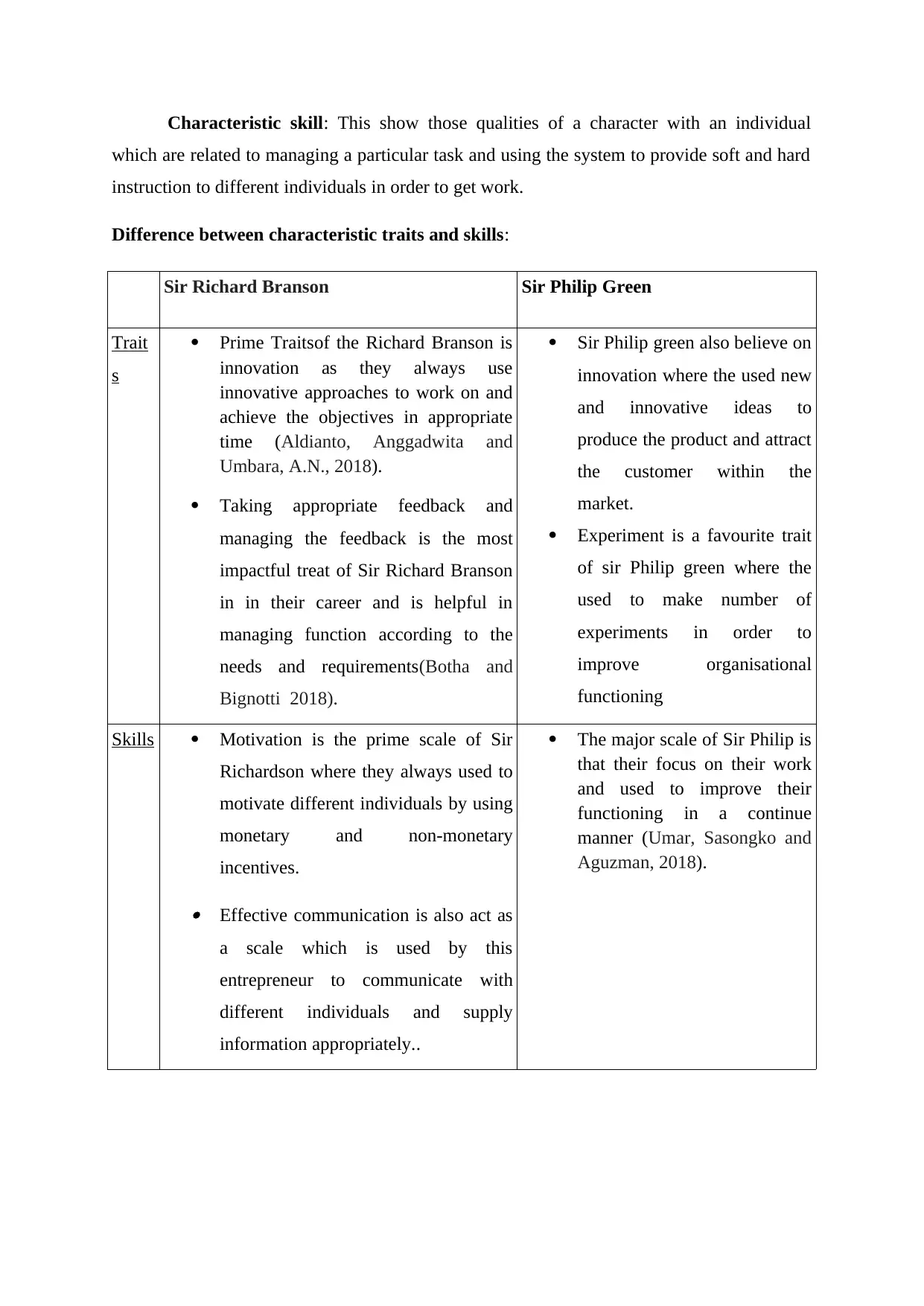
Characteristic skill: This show those qualities of a character with an individual
which are related to managing a particular task and using the system to provide soft and hard
instruction to different individuals in order to get work.
Difference between characteristic traits and skills:
Sir Richard Branson Sir Philip Green
Trait
s
Prime Traitsof the Richard Branson is
innovation as they always use
innovative approaches to work on and
achieve the objectives in appropriate
time (Aldianto, Anggadwita and
Umbara, A.N., 2018).
Taking appropriate feedback and
managing the feedback is the most
impactful treat of Sir Richard Branson
in in their career and is helpful in
managing function according to the
needs and requirements(Botha and
Bignotti 2018).
Sir Philip green also believe on
innovation where the used new
and innovative ideas to
produce the product and attract
the customer within the
market.
Experiment is a favourite trait
of sir Philip green where the
used to make number of
experiments in order to
improve organisational
functioning
Skills Motivation is the prime scale of Sir
Richardson where they always used to
motivate different individuals by using
monetary and non-monetary
incentives. Effective communication is also act as
a scale which is used by this
entrepreneur to communicate with
different individuals and supply
information appropriately..
The major scale of Sir Philip is
that their focus on their work
and used to improve their
functioning in a continue
manner (Umar, Sasongko and
Aguzman, 2018).
which are related to managing a particular task and using the system to provide soft and hard
instruction to different individuals in order to get work.
Difference between characteristic traits and skills:
Sir Richard Branson Sir Philip Green
Trait
s
Prime Traitsof the Richard Branson is
innovation as they always use
innovative approaches to work on and
achieve the objectives in appropriate
time (Aldianto, Anggadwita and
Umbara, A.N., 2018).
Taking appropriate feedback and
managing the feedback is the most
impactful treat of Sir Richard Branson
in in their career and is helpful in
managing function according to the
needs and requirements(Botha and
Bignotti 2018).
Sir Philip green also believe on
innovation where the used new
and innovative ideas to
produce the product and attract
the customer within the
market.
Experiment is a favourite trait
of sir Philip green where the
used to make number of
experiments in order to
improve organisational
functioning
Skills Motivation is the prime scale of Sir
Richardson where they always used to
motivate different individuals by using
monetary and non-monetary
incentives. Effective communication is also act as
a scale which is used by this
entrepreneur to communicate with
different individuals and supply
information appropriately..
The major scale of Sir Philip is
that their focus on their work
and used to improve their
functioning in a continue
manner (Umar, Sasongko and
Aguzman, 2018).
⊘ This is a preview!⊘
Do you want full access?
Subscribe today to unlock all pages.

Trusted by 1+ million students worldwide
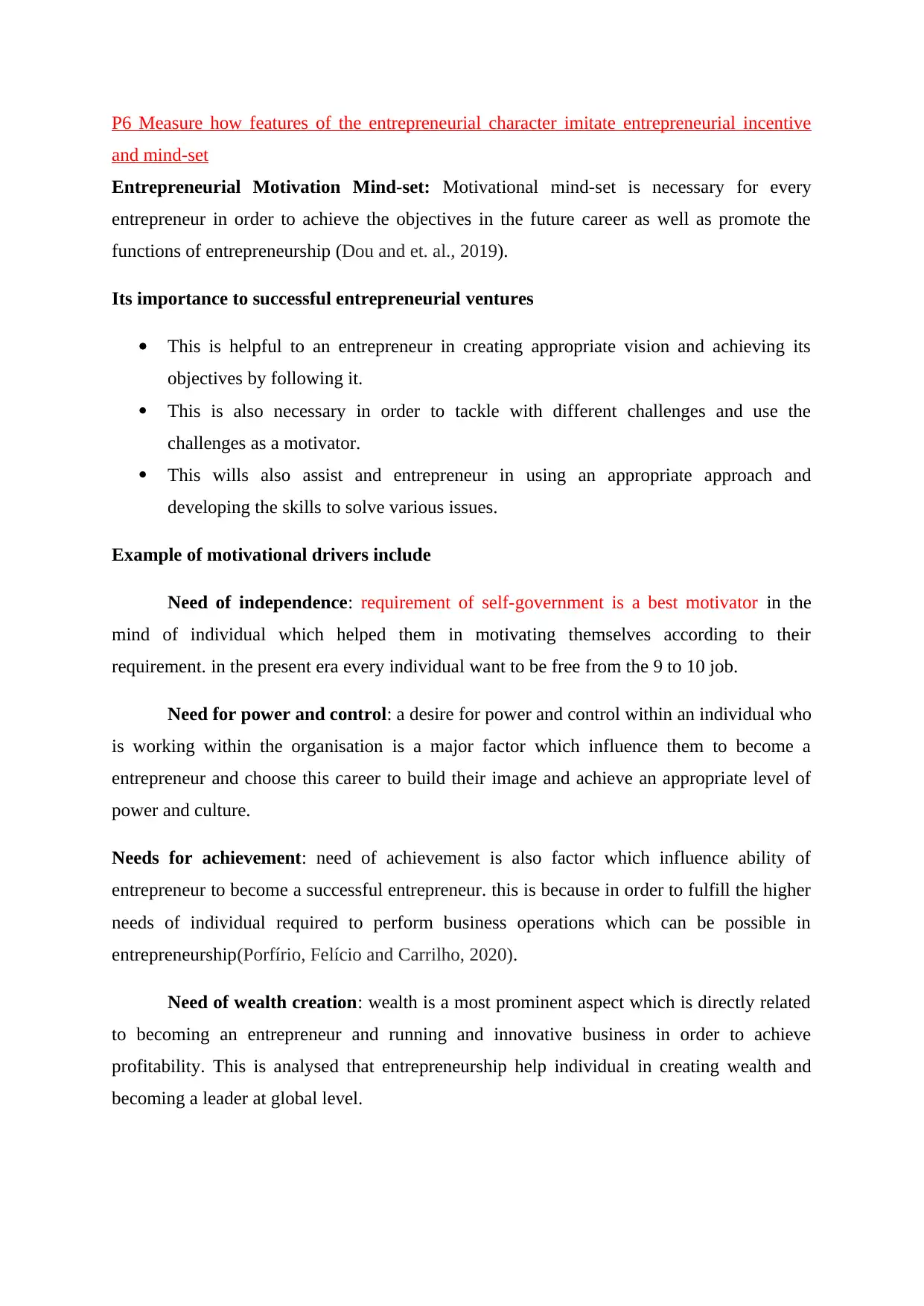
P6 Measure how features of the entrepreneurial character imitate entrepreneurial incentive
and mind-set
Entrepreneurial Motivation Mind-set: Motivational mind-set is necessary for every
entrepreneur in order to achieve the objectives in the future career as well as promote the
functions of entrepreneurship (Dou and et. al., 2019).
Its importance to successful entrepreneurial ventures
This is helpful to an entrepreneur in creating appropriate vision and achieving its
objectives by following it.
This is also necessary in order to tackle with different challenges and use the
challenges as a motivator.
This wills also assist and entrepreneur in using an appropriate approach and
developing the skills to solve various issues.
Example of motivational drivers include
Need of independence: requirement of self-government is a best motivator in the
mind of individual which helped them in motivating themselves according to their
requirement. in the present era every individual want to be free from the 9 to 10 job.
Need for power and control: a desire for power and control within an individual who
is working within the organisation is a major factor which influence them to become a
entrepreneur and choose this career to build their image and achieve an appropriate level of
power and culture.
Needs for achievement: need of achievement is also factor which influence ability of
entrepreneur to become a successful entrepreneur. this is because in order to fulfill the higher
needs of individual required to perform business operations which can be possible in
entrepreneurship(Porfírio, Felício and Carrilho, 2020).
Need of wealth creation: wealth is a most prominent aspect which is directly related
to becoming an entrepreneur and running and innovative business in order to achieve
profitability. This is analysed that entrepreneurship help individual in creating wealth and
becoming a leader at global level.
and mind-set
Entrepreneurial Motivation Mind-set: Motivational mind-set is necessary for every
entrepreneur in order to achieve the objectives in the future career as well as promote the
functions of entrepreneurship (Dou and et. al., 2019).
Its importance to successful entrepreneurial ventures
This is helpful to an entrepreneur in creating appropriate vision and achieving its
objectives by following it.
This is also necessary in order to tackle with different challenges and use the
challenges as a motivator.
This wills also assist and entrepreneur in using an appropriate approach and
developing the skills to solve various issues.
Example of motivational drivers include
Need of independence: requirement of self-government is a best motivator in the
mind of individual which helped them in motivating themselves according to their
requirement. in the present era every individual want to be free from the 9 to 10 job.
Need for power and control: a desire for power and control within an individual who
is working within the organisation is a major factor which influence them to become a
entrepreneur and choose this career to build their image and achieve an appropriate level of
power and culture.
Needs for achievement: need of achievement is also factor which influence ability of
entrepreneur to become a successful entrepreneur. this is because in order to fulfill the higher
needs of individual required to perform business operations which can be possible in
entrepreneurship(Porfírio, Felício and Carrilho, 2020).
Need of wealth creation: wealth is a most prominent aspect which is directly related
to becoming an entrepreneur and running and innovative business in order to achieve
profitability. This is analysed that entrepreneurship help individual in creating wealth and
becoming a leader at global level.
Paraphrase This Document
Need a fresh take? Get an instant paraphrase of this document with our AI Paraphraser
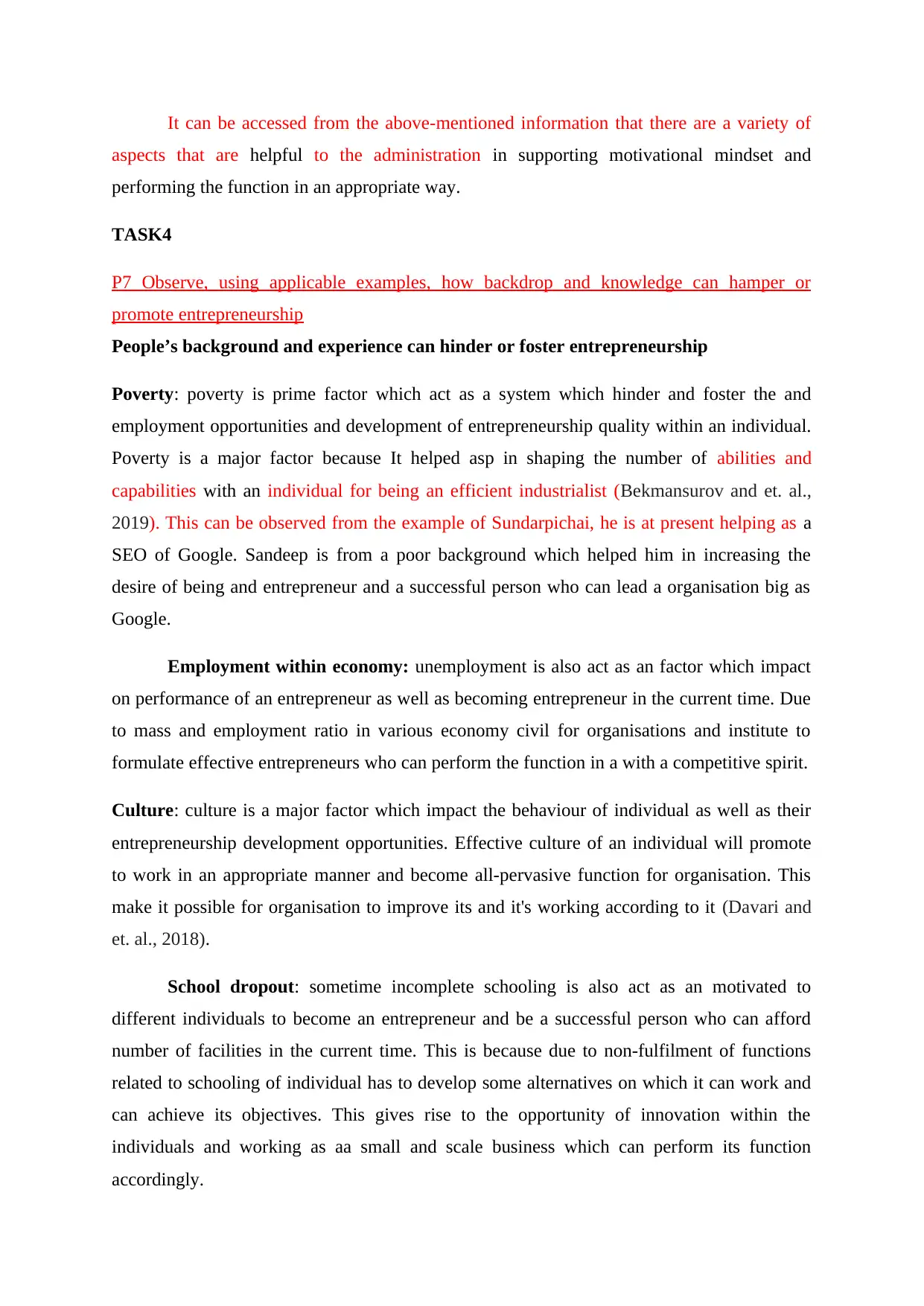
It can be accessed from the above-mentioned information that there are a variety of
aspects that are helpful to the administration in supporting motivational mindset and
performing the function in an appropriate way.
TASK4
P7 Observe, using applicable examples, how backdrop and knowledge can hamper or
promote entrepreneurship
People’s background and experience can hinder or foster entrepreneurship
Poverty: poverty is prime factor which act as a system which hinder and foster the and
employment opportunities and development of entrepreneurship quality within an individual.
Poverty is a major factor because It helped asp in shaping the number of abilities and
capabilities with an individual for being an efficient industrialist (Bekmansurov and et. al.,
2019). This can be observed from the example of Sundarpichai, he is at present helping as a
SEO of Google. Sandeep is from a poor background which helped him in increasing the
desire of being and entrepreneur and a successful person who can lead a organisation big as
Google.
Employment within economy: unemployment is also act as an factor which impact
on performance of an entrepreneur as well as becoming entrepreneur in the current time. Due
to mass and employment ratio in various economy civil for organisations and institute to
formulate effective entrepreneurs who can perform the function in a with a competitive spirit.
Culture: culture is a major factor which impact the behaviour of individual as well as their
entrepreneurship development opportunities. Effective culture of an individual will promote
to work in an appropriate manner and become all-pervasive function for organisation. This
make it possible for organisation to improve its and it's working according to it (Davari and
et. al., 2018).
School dropout: sometime incomplete schooling is also act as an motivated to
different individuals to become an entrepreneur and be a successful person who can afford
number of facilities in the current time. This is because due to non-fulfilment of functions
related to schooling of individual has to develop some alternatives on which it can work and
can achieve its objectives. This gives rise to the opportunity of innovation within the
individuals and working as aa small and scale business which can perform its function
accordingly.
aspects that are helpful to the administration in supporting motivational mindset and
performing the function in an appropriate way.
TASK4
P7 Observe, using applicable examples, how backdrop and knowledge can hamper or
promote entrepreneurship
People’s background and experience can hinder or foster entrepreneurship
Poverty: poverty is prime factor which act as a system which hinder and foster the and
employment opportunities and development of entrepreneurship quality within an individual.
Poverty is a major factor because It helped asp in shaping the number of abilities and
capabilities with an individual for being an efficient industrialist (Bekmansurov and et. al.,
2019). This can be observed from the example of Sundarpichai, he is at present helping as a
SEO of Google. Sandeep is from a poor background which helped him in increasing the
desire of being and entrepreneur and a successful person who can lead a organisation big as
Google.
Employment within economy: unemployment is also act as an factor which impact
on performance of an entrepreneur as well as becoming entrepreneur in the current time. Due
to mass and employment ratio in various economy civil for organisations and institute to
formulate effective entrepreneurs who can perform the function in a with a competitive spirit.
Culture: culture is a major factor which impact the behaviour of individual as well as their
entrepreneurship development opportunities. Effective culture of an individual will promote
to work in an appropriate manner and become all-pervasive function for organisation. This
make it possible for organisation to improve its and it's working according to it (Davari and
et. al., 2018).
School dropout: sometime incomplete schooling is also act as an motivated to
different individuals to become an entrepreneur and be a successful person who can afford
number of facilities in the current time. This is because due to non-fulfilment of functions
related to schooling of individual has to develop some alternatives on which it can work and
can achieve its objectives. This gives rise to the opportunity of innovation within the
individuals and working as aa small and scale business which can perform its function
accordingly.
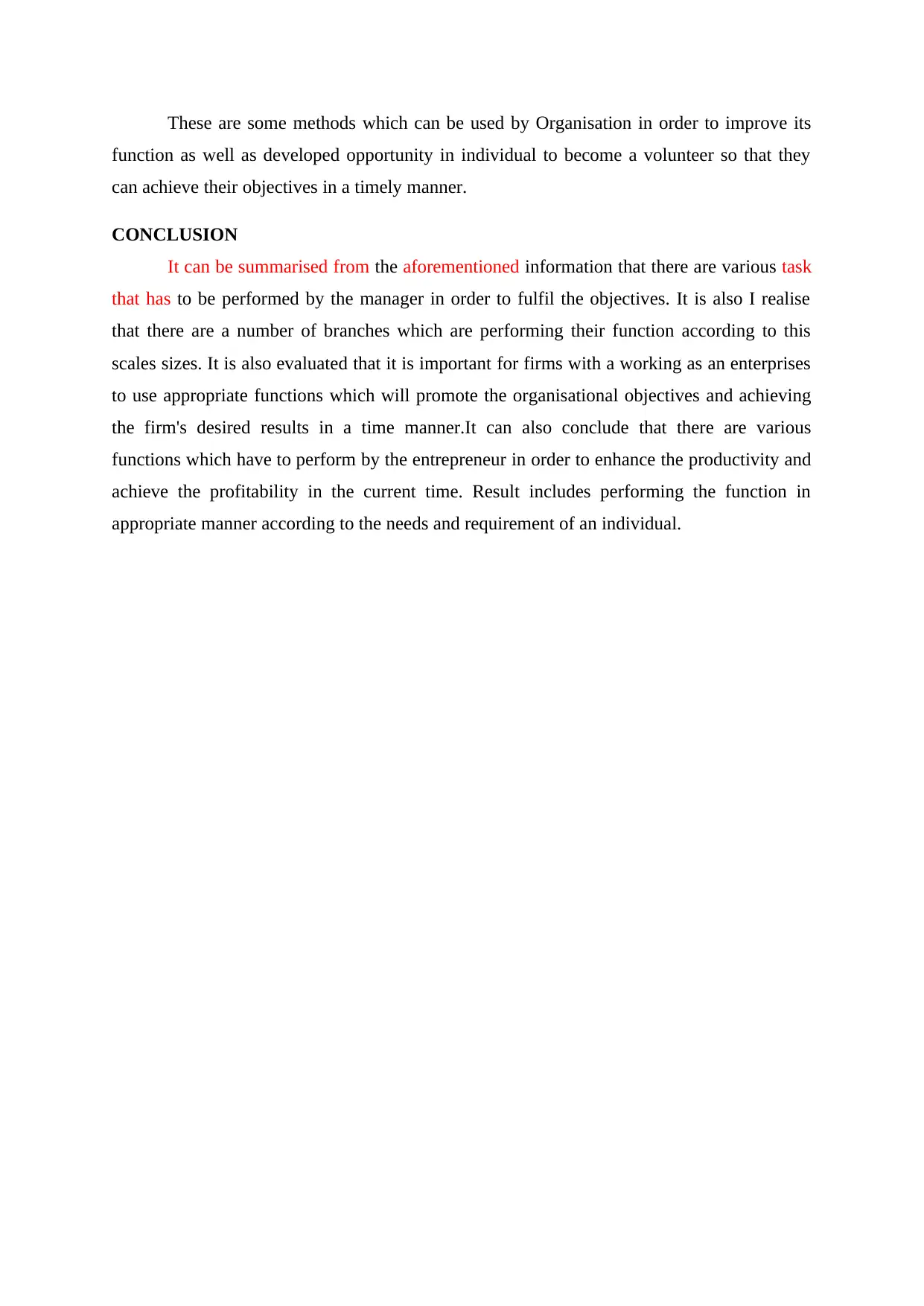
These are some methods which can be used by Organisation in order to improve its
function as well as developed opportunity in individual to become a volunteer so that they
can achieve their objectives in a timely manner.
CONCLUSION
It can be summarised from the aforementioned information that there are various task
that has to be performed by the manager in order to fulfil the objectives. It is also I realise
that there are a number of branches which are performing their function according to this
scales sizes. It is also evaluated that it is important for firms with a working as an enterprises
to use appropriate functions which will promote the organisational objectives and achieving
the firm's desired results in a time manner.It can also conclude that there are various
functions which have to perform by the entrepreneur in order to enhance the productivity and
achieve the profitability in the current time. Result includes performing the function in
appropriate manner according to the needs and requirement of an individual.
function as well as developed opportunity in individual to become a volunteer so that they
can achieve their objectives in a timely manner.
CONCLUSION
It can be summarised from the aforementioned information that there are various task
that has to be performed by the manager in order to fulfil the objectives. It is also I realise
that there are a number of branches which are performing their function according to this
scales sizes. It is also evaluated that it is important for firms with a working as an enterprises
to use appropriate functions which will promote the organisational objectives and achieving
the firm's desired results in a time manner.It can also conclude that there are various
functions which have to perform by the entrepreneur in order to enhance the productivity and
achieve the profitability in the current time. Result includes performing the function in
appropriate manner according to the needs and requirement of an individual.
⊘ This is a preview!⊘
Do you want full access?
Subscribe today to unlock all pages.

Trusted by 1+ million students worldwide
1 out of 14
Related Documents
Your All-in-One AI-Powered Toolkit for Academic Success.
+13062052269
info@desklib.com
Available 24*7 on WhatsApp / Email
![[object Object]](/_next/static/media/star-bottom.7253800d.svg)
Unlock your academic potential
Copyright © 2020–2026 A2Z Services. All Rights Reserved. Developed and managed by ZUCOL.




